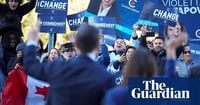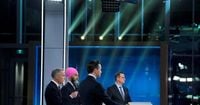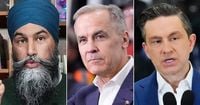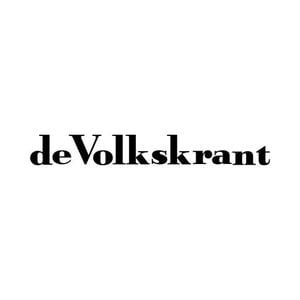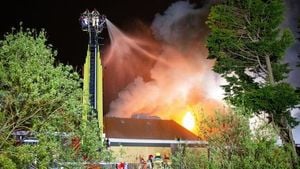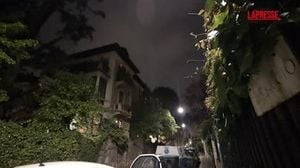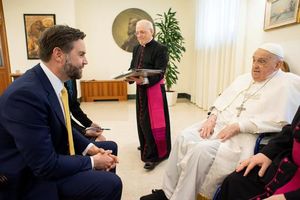As Canada gears up for its federal election on April 28, 2025, advance polls opened today, prompting political leaders to hit the campaign trail following a heated debate that has set the stage for the race ahead. The election comes at a time when significant issues, including U.S. President Donald Trump’s proposed tariffs and his controversial calls for Canada’s annexation, loom large over the political landscape.
On April 17, 2025, four of Canada’s political leaders gathered for a two-hour debate that highlighted the challenges posed by President Trump. Prime Minister Mark Carney, who recently took office as the leader of the Liberal Party, faced off against Pierre Poilievre, the leader of the Conservative Party, alongside Jagmeet Singh of the New Democratic Party and Yves-François Blanchet, leader of the Bloc Québécois. The debate was marked by a consensus among the candidates that Trump’s policies represent a crisis for Canada, yet none offered concrete strategies to counter his influence.
“They want to break us so that they can own us,” Carney stated, drawing on his experience as a former central banker to position himself as a capable negotiator against Trump’s aggressive economic tactics. Poilievre, however, criticized the Liberal government’s past decade in power, claiming it has left Canada vulnerable to U.S. pressures. “We are under the thumb of the United States,” he argued, while also proposing stricter crime policies that have sparked debate among the candidates.
Contentious issues such as crime and public broadcasting funding also dominated the discussion. Poilievre has promised to impose mandatory minimum sentences for certain crimes, a move that Carney condemned as “very dangerous.” Furthermore, Poilievre’s plan to cut funding for the English-language services of the Canadian Broadcasting Corporation (CBC) while maintaining support for its French-language services has raised eyebrows, especially considering the CBC’s significant government funding of about $1 billion annually.
As the election approaches, the legacy of former Prime Minister Justin Trudeau, who stepped down last month, continues to influence the political discourse. Poilievre has labeled the past decade under Trudeau as a “lost Liberal decade,” while Carney has sought to distance himself from his predecessor, stating, “I am a very different person than Justin Trudeau.”
The upcoming election also brings to light the complexities surrounding Indigenous voting. Anishnawbe playwright Drew Hayden Taylor highlighted the conundrum faced by many Indigenous people regarding federal elections. He noted that while some view voting as complicity in a system they see as oppressive, others believe that participating can help address systemic issues. Taylor pointed to the controversial history of Mark Carney’s father, who was once the principal of a Catholic residential school and made disparaging comments about Indigenous education. Carney has since disavowed those views, stating, “I love my father, but I don’t share those views, to be absolutely clear.”
In contrast, Poilievre has faced scrutiny for his past comments regarding Indigenous issues, including a 2008 statement suggesting that Canada’s Aboriginals should focus on hard work rather than compensation for residential school abuses. This has led to criticism from Indigenous leaders, especially in light of recent controversies surrounding Conservative candidate Aaron Gunn, who has made inflammatory remarks about Indigenous history.
Meanwhile, the role of social media in shaping political narratives cannot be overlooked. A recent report from Canada’s Media Ecosystem Observatory revealed that over a quarter of Canadians have encountered fake political content on social media platforms, particularly during this election cycle. The report emphasized the need for increased protections against online disinformation, especially as the election approaches.
Canada’s federal election marks the first national vote in which news from Canadian outlets is banned on Meta products, including Facebook and Instagram, due to ongoing disputes over the Online News Act. Despite this ban, more than half of Canadians still report getting political news from Facebook, raising concerns about the quality of information being disseminated.
Aengus Bridgman, executive director of the observatory, pointed out that much of the content being shared is not fact-checked and can mislead voters. “People using Facebook aren’t often thinking, ‘Am I reading the news?’ But they leave feeling more informed politically,” he noted. This trend is particularly alarming given the rise of fraudulent ads impersonating legitimate news sources, often promoting scams involving cryptocurrency.
Among the troubling content identified were deepfake videos falsely portraying Prime Minister Carney endorsing these fraudulent investment schemes. One such ad claimed, “Mark Carney announces controversial retaliatory tariff plan in response to Trump’s devastating tariff hikes this week,” misleading viewers into believing they were receiving legitimate information.
As the election date draws near, the stakes are high for all parties involved. The candidates are not only vying for votes but also navigating a landscape rife with misinformation and external pressures from foreign entities. Canada’s Security and Intelligence Threats to Elections task force has been monitoring potential foreign interference, particularly from China, Russia, and Iran, as they prepare for a highly scrutinized election.
With the political landscape shifting rapidly and the electorate increasingly aware of the complexities surrounding their choices, the upcoming election promises to be a pivotal moment for Canada. As voters prepare to cast their ballots, the importance of informed decision-making has never been clearer.
